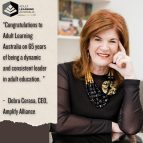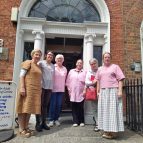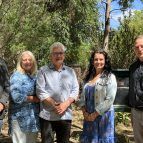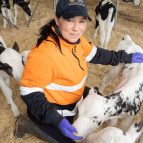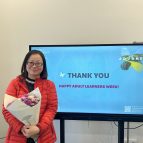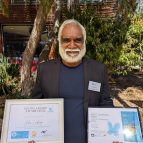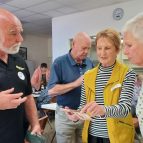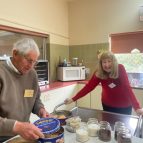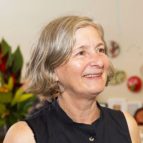Mentors drive success
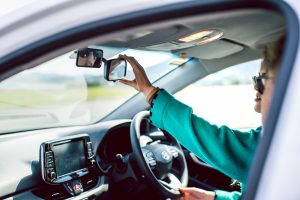
Getting a driving licence is tough if you don’t have the money for lessons or someone who is willing to teach you. A learner driver mentoring program in Geeveston Tasmania is changing the lives of new drivers and their teachers.
The first time learner driver Jennifer Cameron, 38, went out driving with her sister the experience was nerve-wracking. For a start, Brazilian-born Jennifer felt like she was driving on the wrong side of the road. ‘Oh my god I was very, very nervous. My sister was scared too. She was holding on to the door and the edge of her seat the whole time. Afterwards I said, “Would you like to stop and have a drink now?” and she said, “Whisky would be good.”’
But Jennifer knew she couldn’t give up. Without a licence, she was unlikely to find work. ‘At interviews they always ask if you have a licence because they want you to be able to get around.’ And she had to rely on a slow and infrequent bus service to get her to her studies in Hobart.
So when Jennifer heard that her local community centre in Geeveston ran a program that paired learner drivers with mentors she immediately signed up.
Dr Lauren McGrow runs the JumpStart program at Geeveston Community Centre, one of 18 Learner Driver Mentor programs across Tasmania. Geeveston is notable for its starring role in the ABC series Rosehaven. It’s an hour by car from Hobart, is on the cusp of the south west wilderness area.
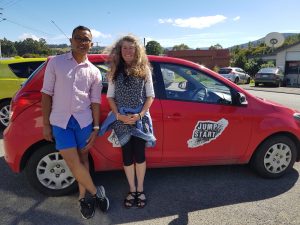
The town is a magnet for tourists and people interested in alternative lifestyles. But it has its fair share of people disadvantaged by unemployment, family breakdown or mental health issues. And those without a car or a licence are even less likely to find work and are more isolated, Lauren says.
The program is for people who don’t have the money or the people in their lives who can take them out on the road.
‘Jumpstart is really important to places like this. Geeveston is a remote town and public transport is shocking. If you don’t have a licence or a car and your job is not in town it’s really difficult. You end up having to hitchhike or rely on lifts from other people, or sometimes you stay home,’ Lauren says.
Matching mentors with learners
When Jennifer met her mentor Paul for the first time her worries about driving with a stranger evaporated. ‘We had a talk and I felt good about him.’
But Jennifer didn’t think she’d ever get used to driving on Australian roads. ‘At the start I was a bit lost because it’s very different here. In Brazil you do a short course to learn the rules and you do a test on a computer and start driving, but not on the street, at a training venue.
‘I’ve been very lucky to get Paul as my mentor. He is very patient and calm. He explains things well, “Do this, do that, go slowly.” Sometimes I go fast. If I do something wrong sometimes I say, “Did I scare you?” and he says, “Not yet.” He’s a good person to learn with.
‘When I do something right he says “You did a good job.” So I know I am learning and that makes me more confident. He is more confident with me too and is happy that I’m doing things right. I am much more relaxed now when I’m driving.’
They spend one or two hours each week driving to local towns and have plans to travel further afield.
Jennifer is planning to go for her probationary licence in June and is excitedly saving for a car.
Her sister feels safer with Jennifer behind the wheel too. ‘I drive her to Hobart and back again and she doesn’t hold on like she used to.’
Passing on experience
Simon Hill, 55, has been a Jumpstart mentor for three years. ‘I saw a poster advertising Jumpstart up on the board in the local shopping centre. I thought “Geez that sounds like something worthwhile”. I got a motorbike licence when I was 16 and my car licence when I was 18 and it changed my life. At the time I was living in a remote area of England and it was always a challenge to get instructors to come out and teach you.’
‘It is good to be able to give something back and I know from my own experience how influential having a license is in opening up all sorts of opportunities in your work and social life.’ Simon Hill, Jumpstart mentor
‘The best thing is helping learners to enjoy the freedom and independence that a drivers licence gives you. With a licence if you want to go anywhere or do anything you can do it to your own timetable, not the bus company’s.’
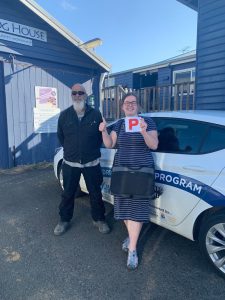
For Simon, good mentoring is all about helping learners believe in themselves. ‘If I take someone out and they say “I’m a bad parker” I say “You’re not a bad parker, you just haven’t practised enough. I’ve done it for 35 years.”
‘And it’s very satisfying. ‘There’s something to be said for that moment when you see everything start clicking. One minute you see your learner is afraid and thinking they can’t do it and the next minute you see it dawn on them, “I can do this.” There’s a certain amount of joy in that. And there’s joy and excitement for me when I take them to the test and they pass.
What makes a good mentor
‘I didn’t think I’d have the patience for it that I have. I try to put people at ease. You have to have a good sense of humour too. I say to the learners, “The only time you have to worry is when I grab the “Oh Jesus” rail.” And that makes them laugh. Driving is fun. I enjoy it and hopefully I can pass that on.
‘It’s really good to pass on years of experience and help people be a little safer on the road. I try and make it something enjoyable even though you have to take it seriously.
‘I remember the first time I drove on my own. You have to get past the fear, the sweaty hands on the steering wheel and enjoy the fact that all of a sudden you’re in charge and you can put your foot down and go where you want.’
‘Mentors get a lot out of it. They love seeing their learners get their Ps. Mentors also improve their own skills because they’re constantly thinking about the rules and their own driving.’ Dr Lauren McGrow, Jumpstart
Mentors learn from drivers
Lauren says Jumpstart takes learners of all ages. People as young as 17 or as old as their late 60s, jobseeker and retirees, have gained their licences through the program.
‘We give a lot of support to our mentors. Mentors are paired with someone they would never normally meet in ordinary life. They spend a lot of time one-onone in a vehicle and they begin to talk and share and form a bond and the mentor imparts their values and ethics and the driver feels very supported by them. It happens quite naturally and beautifully.
‘In more traditional communities they have rituals around young people becoming adults where older people open up the way to adulthood for younger people and I think that this is what happens in our driver program.
‘Sometimes mentors will come and say to me “You wouldn’t believe the things that that young person is telling me” and I say “It’s great that they are so open with you, it shows how much they trust you.” Some mentors stay in touch with their drivers over many years. Mentors often feel that they have watched young drivers grow up. They’ve watched them get their licence and move into jobs and they’re very proud of the young people. So mentors get a lot out of the process.’
And the experience opens up learning opportunities for mentors, Lauren says. They improve their own driving skills and knowledge as well as often getting involved in a broader range of activities run out of the community centre.
‘Our community centre is a place that brings people together with a focus on lifelong learning and building connections between people.’ Dr Lauren McGrow, Jumpstart
Life opens up for drivers
For people who get their licence later in life the benefits are enormous, Lauren says, particularly people who relied on someone else to do all the driving. ‘If you don’t drive and your primary partner has died you can be very vulnerable because you are so isolated and dependent on other people.‘
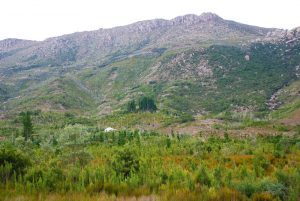
One 60-year-old woman who had relied on her husband to drive found herself stuck in a very remote region after he died. Instead of moving away, she decided to stay put and get her driver’s licence and signed up for Jumpstart. Her story is not uncommon, Lauren says. And she sees big changes.
‘Life really opens up for them and they can make social connections they couldn’t before. They can travel from remote and isolated towns to places like Huonville and Hobart to join associations and clubs that meet every week. It helps people to build relationships and they develop new confidence. To be an older person and learn new skills keeps them open to life and its possibilities. They grow and change.
‘So having your licence and mobility builds resilience in older people. It can change your self-perception too. You have learnt a new skill and it’s not been easy but you’ve done it. And it’s something that for 20 or 30 years you have not had the guts or the opportunity to do but now you can, so it shows people a new side of themselves.’
Getting your licence late in life is a powerful lesson, Lauren says. ‘You are not the person you thought you were, you can access things inside yourself that you didn’t know were there. It’s so important to know that life can open up in new ways in all phases of life, even if you are a much older person.’
Success encourages learning
‘Having a good experience of education is so important to many of our learner drivers especially those who didn’t like school. When they have a good experience with a mentor teaching them they think “Hey I can take on more learning.”
There are so many educational opportunities for Tasmanians but they are mostly centred in Hobart and Launceston. So if you have no easy access to the cities you’re going to be locked out of so many things. Having a licence gives people confidence and access to so much more.’
Read the full issue of Quest 1, 2021

